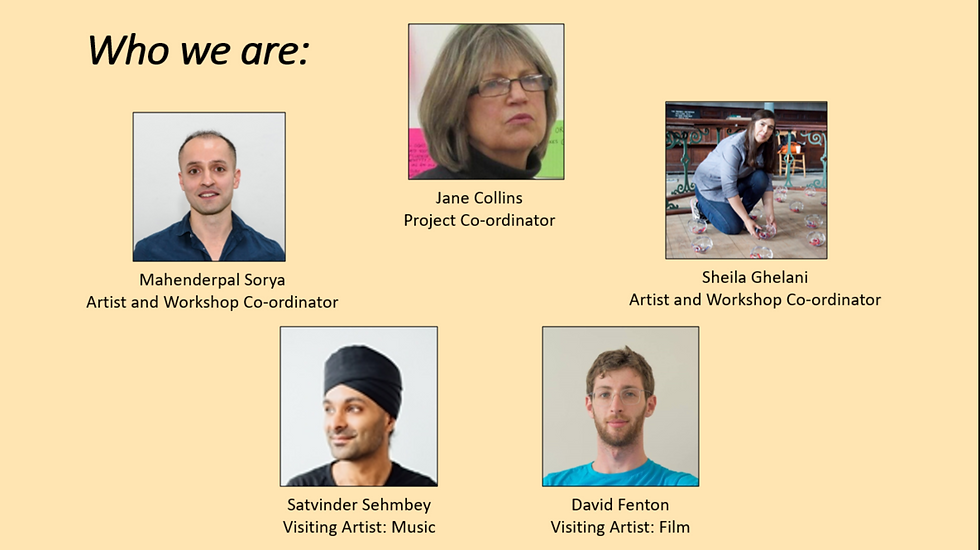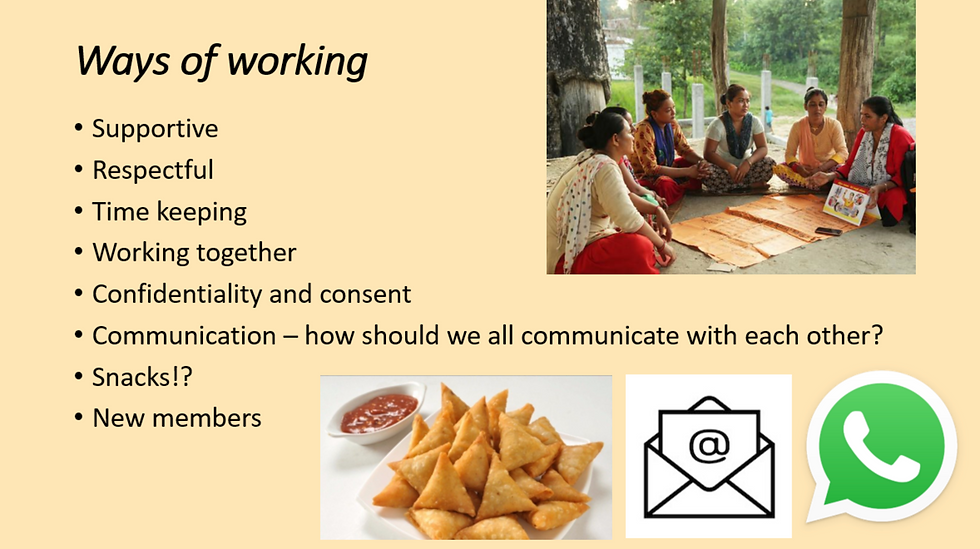The Beginning, Workshop 1: 12/02/2020
- msorya2
- Feb 17, 2020
- 4 min read
Updated: Feb 25, 2020

The first session began with introductions to the project, its aims, partners and coordinators/ visiting artists. There was a real excitement and energy in the room, particularly as a consequence of the enthusiasm and diversity of the participants that turned up. For example. Tejinder Pal Singh, who was first to arrive, talked about the Punjabi theatre Academy he had established in the UK (www.punjabitheatreacademy.com), Mohinder is a dancer who is experienced in working with community groups, Other participants were both open and excited by the potential outcomes from this project: a performance, book, film, music etc. What was most interesting was how the introduction (particularly the key questions) had already generated a lot of discussion - several key themes seemed to emerge, for example:
- Housing: Kuldip talked about when he arrived in the UK, there would often be several people sharing a small living space, which was negotiated around the different shifts they worked.
- Food: Some members recalled popular restaurants and foods - food had been an important way of reconnecting with 'home' but also in forming a new community.
- Work: southall was attractive due to its proximity to warehouses/ industries such as food production and manufacturing. But also its proximity to Heathrow - a few of the participants had either worked at or currently work at Heathrow
- Motivation: Kuldip made a point which really struck me - he described how the original intention of coming to the UK was to make money and then return to India. I had never really come across this idea before - but coincidentally came across a text by Paula Richman on south Asian Immigration to Southall, who explores the factors which made it challenging for South Asian immigrants to accrue enough savings to return:
"Sikhs or Hindus and mainly Punjabi speakers, many of those who arrived in the first cohort, came from the peasant proprietor class and had lost land, savings, and security through the dislocation that accompanied Partition. A large number of them could find jobs only at factories in or near Southall at low pay, with long hours and few benefits. Many South Asian men worked on assembly lines and custodial crews in industries and at Heathrow Airport, while South Asian women were employed in large numbers in laundries and bakeries. Since the majority of early immigrants were not fluent in English, factory owners sought sought them as cheap labor unlikely to receive protection from the nearly all-white British unions.
Over the next decade, many men who planned a short stay in the U.K. to save money and return home ended up staying on, at least partially because minimal wages and high housing costs made it difficult to accrue savings. gradually, some sponsored family members to join them in Southall."
Paula Richman (2001) Questioning Ramayanas: A South Asian Tradition, University of California Press

Once the project had been introduced to participants, they were then set the task of pairing up with another participant they did not know and sharing three things about themselves, They would then introduce their partners to the whole group - remembering as much as possible of what they had been told! I introduced Rajinder Sahota - and was amazed that one of the things he wanted to share was that he came to the UK on 21st July 1968 (I was impressed he had remembered the exact date!) After studying Motor vehicle engineering, he worked for much of his life for British Airways. Janpal was introduced by Parmy as the Manager of Southall Community Alliance who remembered having a carefree upbringing in the UK. Parmy was born in the mid 60s and equally remembered how freely children used to play on the streets. she also shared how she experienced 'culture shock' after visiting India for the first time in the 1970s. Jasmin was introduced by Kam as someone who recently had a baby and is on maternity leave from her job in a Dental practice in Harrow. Jasmin introduced her son Krishan born on 1st December 2019 - only 2 months and 10 days old, Krishan was asleep for most of the session, but woke up in time to be introduced as our youngest member! Kam was introduced as having just recovered from a knee operation and having 2 sons - one now living in Australia. Mrs Raj remembered how her dad arrived in the UK in 1962 and then she came here in 1968. she found work in a laundry and remembers being paid half a crown per hour (£5 per week). Andre was 20 years old when he arrived here from Mauritius as a student nurse. Kusum was introduced as arriving from Nairobi before working in a pharmacy and raising 2 children (1 boy and 1 girl) she also has 3 grandchildren. Mohinder introduced Bubbli (Harish) as a 'nice helpful woman' well known in the community, she has five children and works in security at Heathrow. Mohinder (Mrs Midha) had run her own business and has links with local radio station. Finally Mrs Sharma introduced 'Bubbli's husband' (Kuldip) who arrived in the UK as a young boy. Mrs Sharma was introduced as someone who has spent a lot of time raising her children and working- she has worked at Heathrow for 22 years.
Other issues raised included how we'd involve those in the community who would need transport as well as a translation service - both can be easily arranged and participants were encouraged to refer new participants, without either being a worry. Some participants were also keen for the network to include universities in other parts of India (e.g. Punjab), which is something that could be developed as the project progresses.
M.Sorya (16.02.2020)
Notes from activity:




Slides introducing the project:


















Comments